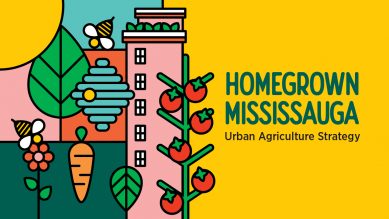Growing Locally: The City Launches its First-Ever Urban Agriculture Strategy
Environment | June 1, 2022
Today, General Committee welcomed the City’s first Urban Agriculture Strategy (UAS) designed for, and with, the community’s needs in mind. The goal is to grow more food locally to ensure everyone has access to healthy foods in their neighbourhoods.
Over the next 10 years, the strategy will help:
- Enhance and grow urban agriculture efforts
- Promote and support inclusive, culturally relevant local food options expand
- Improve food security
- Support climate mitigation and adaptation efforts
“Over the course of a year, almost 26,000 people visited a food bank in Mississauga. That’s nearly 1 in 28 people in our city who are experiencing challenges putting food on their table. This is a serious concern that will only grow as the cost of food continues to rise. All residents, especially our most vulnerable, have a right to access fresh and healthy food,” said Mayor Bonnie Crombie. “Mississauga’s Urban Agricultural Strategy will allow us to diversify our local food sources, increase the resiliency of our food supply, and address food insecurity in our community – all steps that will break down barriers to equitable access to healthy and nutritious food.”
The City’s Urban Agriculture strategy is made up of 18 actions – 11 City-led and seven community-led. These actions are designed to help remove barriers and enable urban agriculture in Mississauga. It will encourage healthier lifestyles, empower the community to learn new skills about growing and harvesting produce and will strengthen relationships between the City and the community. The strategy was developed through conversations with stakeholders, including equity deserving and marginalized groups and communities, with deliberate recommended actions and roles that both the City and the community can take.
Three key areas of focus emerged during the City’s extensive engagement process with the community which include:
- Cultivate Relationship: Encourage Urban Agriculture
- Grow and Share the Harvest: Remove Barriers to Urban Agriculture
- Plant and Steward Seeds: Enable Urban Agriculture
“Developing a more comprehensive Urban Agriculture Strategy will not only help to address the critical issue of food security, which has been heightened as a result of COVID-19, but will help Mississauga adapt to climate-related impacts by strengthening community resilience and preparedness,” said Stefan Szczepanski, Acting Director, Parks, Forestry and Environment.
For more than 15 years, the City has supported a community garden program with a local not-for-profit organization, Ecosource – growing the number of gardens over the years and providing educational and gardening opportunities for Mississauga’s residents. Today, there are nine community gardens and one teaching garden and approximately 50 per cent of the food grown is donated to local food banks.
The City also has several farmers markets and a wide range of urban gardeners including residential gardeners, not-for-profit organizations and businesses, which leverage local food growing. Through the development of the strategy, the City learned what additional supports and actions were required to further enable and allow urban agriculture to thrive across the community.
The call to develop urban agriculture was included as an action in the City’s Climate Change Action Plan, which is helping the City mitigate and adapt to a changing climate. It promotes sustainable and innovative farming solutions like hydroponic and aeroponic gardening that use less waste, water and fuel compared to traditional practices.
There are many ways urban agriculture and climate change are connected including:
- Growing food in the city helps to reduce food miles travelled and travel time from farm to plate, thereby reducing greenhouse gas emissions
- More green spaces can increase biodiversity, support pollinators, reduce the urban heat island effect and can absorb water – preventing or minimizing flooding
- Growing organically and using sustainable methods reduces the need for fertilizers and pesticides, and improves soil health
- Encouraging plant-based diets help to reduce greenhouse gas emissions and environmental degradation related to animal agriculture
Read, take action or learn more about the Urban Agriculture Strategy: mississauga.ca/homegrown.
The Urban Agriculture Strategy will go to Council for final approval on Wednesday, June, 8, 2022.
Background:
Information about the Community Garden Program can be found through the City of Mississauga and Ecosource websites.
Information about Farmers Markets in Mississauga can be found at visitmississauga.ca/listing-category/farmers-markets/.
Benefits of Urban Agriculture
The benefits of urban agriculture are numerous. Some include:
- Environmental
- Reducing food miles
- Improving soil health
- Supporting biodiversity and pollinator habitat
- Social
- Improving food security
- Providing educational opportunities to increase food literacy for all ages
- Providing opportunities to grow culturally diverse food
- Economic
- Supporting local food entrepreneurship
- Growing food at home or in the city can mean less money spent at the grocery store
- Health
- Eating more nutritious foods like fruits and vegetables
- Participating in gardening can benefit physical and mental health
Media Contact:
City of Mississauga Media Relations
media@mississauga.ca
905-615-3200, ext. 5232
TTY: 905-896-5151
Tags
Media contact
City of Mississauga Media Relations
media@mississauga.ca
905-615-3200, ext. 5232
TTY: 905-896-5151




